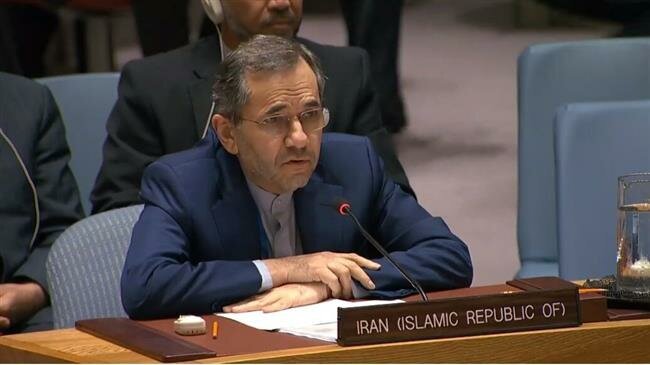No Talks As Long As US Economic Terrorism against Iran Continues: Envoy

Iran’s ambassador to the United Nations described the ouster of US National Security Adviser John Bolton as a domestic issue and said as long as Washington follows its policy of “economic terrorism” against Tehran, no negotiation would take place between the two.
In remarks on Tuesday evening, Majid Takht Ravanchi said the issue of changes inside governments is an internal issue and so is the ouster of Bolton.
He further pointed to the impact of Bolton’s departure on the White House’s hawkish and extremist policies on Iran and said it is too early to judge.
“Whether or not the American policy of extremism (toward Iran) will change depends on the various factors that influence the US foreign policy,” he said.
“We have stated many times, as the respected president of the Islamic Republic of Iran has made it clear, that as long as these cruel sanctions and the economic terrorism of the US government against the Iranian people continue, there would be no negotiations,” the diplomat added.
Iranian Foreign Minister Mohammad Javad Zarif has always blamed Bolton for the US hawkish policies toward Iran and referred to him as a member of the B-Team.
The B-Team in Zarif’s comments refers to a group of four anti-Iran hawks, including Bolton, Israeli Prime Minister Benjamin Netanyahu, Saudi crown prince Mohammad Bin Salman Al Saud, and crown prince of Abu Dhabi Mohammed bin Zayed Al Nahyan.
US President Donald Trump, who said he had disagreed “strongly” with Bolton on policy, announced on Tuesday via Twitter: “I asked John for his resignation, which was given to me this morning.”
A replacement -- the White House’s fourth national security chief in less than three years -- would be named next week, Trump said.
Bolton, who had been scheduled to give a press conference at the White House on an unrelated matter, denied being fired and insisted that he had resigned.
The developments came against the backdrop of increased tensions between Iran and the US with Washington imposing new sanctions against the Islamic Republic.
The US has ratcheted up pressure on Iran since last year after withdrawing from the 2015 nuclear deal, known as the Joint Comprehensive Plan of Action (JCPOA).
Since then, the Trump administration has been trying to reduce Iran’s oil exports to “zero,” and has sent an aircraft carrier strike group, a bomber squad, an amphibious assault ship, and a Patriot missile battery to the Middle East to try to stack up pressure on Tehran.
Iranian officials, however, have dismissed such moves as psychological warfare, saying the country has its own ways of circumventing the American bans and selling crude oil.
